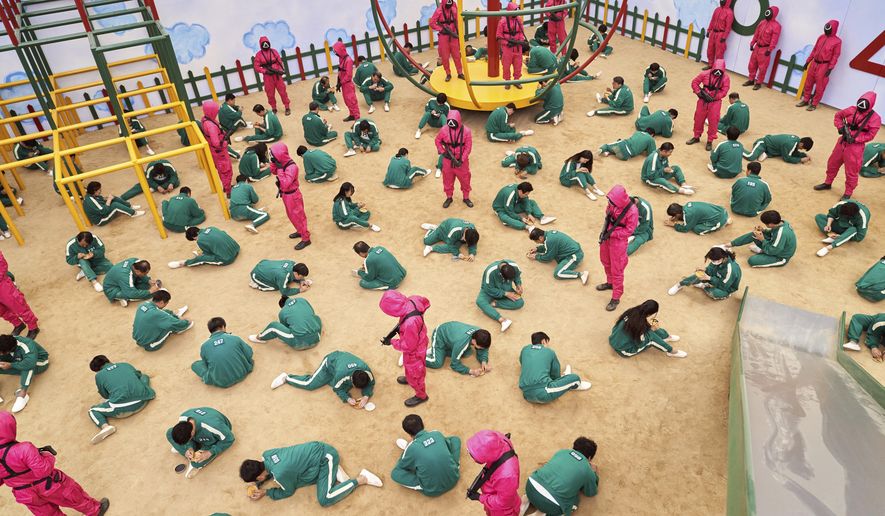Reports that Netflix is renewing the hyper-violent “Squid Game” for a second season have alarmed media watchdogs concerned about the South Korean series’ influence on American children.
Media watchdogs said Thursday they had found children across the country mimicking the dystopian show’s “Hunger Games”-style survival scenarios at playtime, dressing like the characters for Halloween and viewing the most violent clips on TikTok and YouTube.
“Despite the enormous popularity of ’Squid Game,’ the frequent graphic violence, full nudity, and prolific profanity contained in the first season alone should give parents extreme pause on letting their children watch this adult program,” said Melissa Henson, program director at the Parents Television and Media Council.
The Los Angeles-based parents’ group has called on Netflix to ensure the popular program “is not marketed to children,” Ms. Henson added.
Melanie Hempe, who directs a healthy screen use program for parents at the nonprofit Families Managing Media, said “Squid Game” revives perennial concerns that violent video content “stimulates the limbic area of the brain and triggers adrenaline” in a way that increases children’s “aggressive thoughts, behaviors and anxiety.”
“Consuming violent media content during childhood causes more harm than most parents realize,” Ms. Hempe said, adding that her ScreenStrong platform offers parents resources for filtering the content their children consume on social media.
“What may be considered entertainment for adults may be horrifying in the mind of a child. Kids mimic what they see, they don’t have the brain capability to filter out damaging influences,” she said.
The Associated Press reported Tuesday that creator Hwang Dong-hyuk said “Squid Game” has been renewed for a second season on Netflix, although Netflix would not confirm the news.
Netflix did not respond Thursday to a request for comment.
The streaming service’s website says the show revolves around “456 desperate contestants” in deep financial debt who compete with each other “in a mysterious and deadly” series of childhood games like “red light, green light” to win 45.6 billion South Korean won (about $39 million).
Killed in spectacular ways when they lose, only one of the characters will survive when “Squid Game” ends.
Korean-American activist Africa Yoon, author of the forthcoming memoir “The Korean,” said the show “touches on the financial insecurity that most face globally; it also allows them at the same time to be in touch with childhood and games.”
She also told The Washington Times that the show has further popularized South Korean culture, which had already become an established presence on streaming services through K-Pop music videos and “koreanovela” soap operas.
“It’s popular because it is inclusive,” Ms. Yoon said Thursday.
“What people are learning through the internet is something global travelers have known for a long time: you can go across the world, to a place far from where you are born and … find yourself,” she added.
The show’s references to Korean culture include the “Hallyu” wave-embrace as well as references to music, cinema and foods like Kimchi.
It’s precisely these inclusive appeals to the popularity of Korean culture that make the show attractive to children outside of its adult target audience, according to mental health experts.
Retired Army Lt. Col. Dave Grossman, a former West Point psychology professor and author of several books on the psychology of killing, said television censors would send a clearer message to parents by changing the “TV-MA” rating to an “X” for shows such as “Squid Game.”
“Every kid thinks he’s mature,” Mr. Grossman told The Times.
Douglas Gentile, a psychology professor at Iowa State University who studies the influence of media violence on children, said studies have repeatedly shown that violent videos make children more aggressive in their fantasies and in their responses even to accidental provocations.
“You start to believe it’s normative to react to being hit by hitting back. Media violence shows this all the time when the hero models violence as an appropriate response,” Mr. Gentile told The Times.
In a three-year study of more than 3,000 children, published March 2014 in JAMA Pediatrics, Mr. Gentile reported that violent images changed the thinking patterns of participants in a way that made them act more aggressively.
Research shows that violent images have the same effect on children whether they come from video games or television shows such as “Squid Game,” he said Thursday.
“These types of shows don’t create copycat violence, but they do change the way children see things in a way that makes them more likely to behave aggressively when provoked,” Mr. Gentile said.
Health officials first began voicing concern about “Squid Game” when the show, released Sept. 17 on Netflix, quickly became one of this year’s most-searched Halloween costumes on Google Trends.
David Anderson, head of school and community programs at the Child Mind Institute, said in an Oct. 20 statement that no one younger than “late adolescence” should view the show.
“The level of violence is horrifying — more than most shows,” Mr. Anderson said in the statement.
• Sean Salai can be reached at ssalai@washingtontimes.com.




Please read our comment policy before commenting.